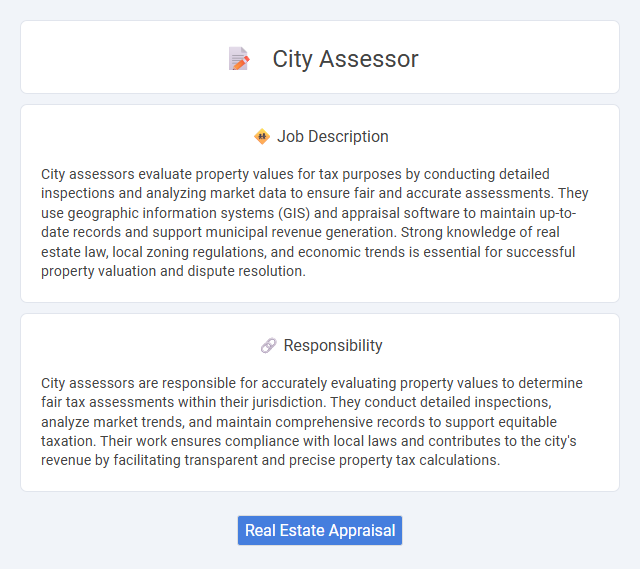
City assessors evaluate property values for tax purposes by conducting detailed inspections and analyzing market data to ensure fair and accurate assessments. They use geographic information systems (GIS) and appraisal software to maintain up-to-date records and support municipal revenue generation. Strong knowledge of real estate law, local zoning regulations, and economic trends is essential for successful property valuation and dispute resolution.
People who are detail-oriented and comfortable working with numbers and property data are probably well-suited for a city assessor job. Those with strong analytical skills and an ability to communicate complex information clearly are more likely to succeed in this role. Individuals who prefer a dynamic work environment involving field inspections and office tasks might find this position a good fit.
Qualification
City assessor positions require a strong background in real estate appraisal, finance, or public administration, often necessitating a bachelor's degree in these fields. Professional certifications such as the Certified Assessment Evaluator (CAE) or Residential/General Appraiser Licenses enhance credibility and career advancement opportunities. Candidates must possess analytical skills, knowledge of property tax laws, and proficiency in valuation software to accurately assess property values for taxation purposes.
Responsibility
City assessors are responsible for accurately evaluating property values to determine fair tax assessments within their jurisdiction. They conduct detailed inspections, analyze market trends, and maintain comprehensive records to support equitable taxation. Their work ensures compliance with local laws and contributes to the city's revenue by facilitating transparent and precise property tax calculations.
Benefit
City assessor jobs likely offer competitive salaries and comprehensive benefits, including health insurance and retirement plans, which can enhance job security and financial stability. Employees may have opportunities for professional development and career advancement, contributing to long-term job satisfaction. The role is expected to involve meaningful community impact, increasing the likelihood of personal fulfillment in public service.
Challenge
City assessor jobs likely involve complex challenges related to accurately valuing diverse property types within fluctuating real estate markets. These challenges often require a strong understanding of local zoning laws, economic trends, and property tax regulations to ensure fair assessments. The role probably demands continuous learning and adaptability to leverage emerging technology and data analysis tools for improved valuation accuracy.
Career Advancement
City assessor positions offer significant opportunities for career advancement through gaining expertise in property valuation, tax assessment, and local government regulations. Professionals can progress from entry-level roles to senior assessor, department manager, or chief appraiser by acquiring certifications such as the Certified Assessment Evaluator (CAE) and demonstrating proficiency in data analysis and property law. Continuous professional development and involvement in municipal planning or tax policy committees further enhance promotion prospects within city government.
Key Terms
Real Estate Appraisal
City assessors specializing in real estate appraisal evaluate property values for tax assessment purposes by analyzing market trends, property conditions, and comparable sales data. They utilize advanced appraisal software and GIS mapping tools to ensure precise and equitable property assessments across residential, commercial, and industrial sectors. Accurate appraisals conducted by city assessors directly impact municipal revenue and help maintain fair property taxation within the community.
 kuljobs.com
kuljobs.com